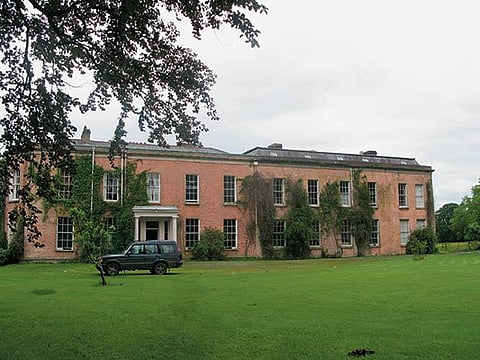
- Destinations
- Experiences
- Stay
- What's new
- Celebrating People
- Responsible Tourism
- CampaignsCampaigns
- SubscribeSubscribe
- Buy Now

Radu comes to fetch me at the airport as I arrive in Dublin by Aer Lingus, in a rather battered looking car. I get in and realise it&rsquos nothing less than a pigsty, or a cow shed, if you like the smells are strong, but the car is dirty in a charming, acceptable sort of way. Not knowing what this was all about I looked at the dishevelled twenty-something with a bit of suspicion and nervousness. He gives me a bright smile and tells me that the drive to the &lsquoestate&rsquo will take about 45 minutes. I was going to be on an estate Invited to perform at the first edition of the Hay Festival in Carlow, this rugged start to my trip was unconventional and exciting.
During the drive I am told that I will be staying at the Knockmaroon Estate, which I realised later is one of the estates of the Guinness Family Vivienne (who is the co-curator of the festival) and Keiran Guinness (the grandson of Arthur Guinness, the founder of the Guinness Brewery), their wonderful children and their Romanian caretakers, Radu and his wife Andrea, are my gracious hosts.
The estate is located in Castleknock (&lsquoCnucha&rsquos Castle&rsquo), eight kilometres west of the centre of Dublin. Now a suburb, Castleknock was once a rural village in western County Dublin until the late 1960s, when the first housing estates began to be developed.
 The audience awaits the next reading at The Chapel in Borris House. Dublin city itself is a short fifteen-minute cab ride from the estate, a city that is a lot of things at the same time. Vibrant, buzzing with young energy, jaded, new &mdash a contrast to the rest of Ireland, which is relatively more laidback. A bit of walking around and, despite the large crowds, you can sense an older, poorer city as you would in other parts of Europe. The spirit of Dublin has its contradictions too, youthful energy set against deeply embedded traditionalism. I couldn&rsquot help noticing that the older ones in the pub were happy with their pints of Guinness while the younger seemed to go for the newer ales and ciders In these legendary and plentiful bars the air is one of garrulous sociability mingled with the love for banter &mdash one that made me very comfortable given the Indian sensibility of &ldquohow friendly we are as a people&rdquo.
But it is the trip to Carlow that I am really excited about Carlow (Irish Ceatharlach, &lsquoplace of cattle&rsquo) is situated in the south-east of Ireland, 84km from Dublin. And it is here, at the Borris House, that artistes and writers have collected from various continents to be a part of the debut of a collaboration with the world-renowned Hay Festival. The Festival brought together leading international writers with well-known Irish scribes for a two-day celebration of talk, memoir, fiction, debate, film, comedy, performance and reading. The festival here was part of the Éigse Carlow Arts Festival. Éigse is the plural of &lsquoÉigeas&rsquo (Irish for poetry gathering) &mdash the focus on poetry and the Irish language with which the festival began a few years ago.
 Borris House is foremost a home, lived in by the Kavanaghs, former Celtic kings, for the past 550 years the family &mdash three generations of them &mdash continue to live there. Both the house and family are steeped in Irish history. Considered to be one of the finest houses in Ireland, it is stunningly elegant and has great charm. Adorned with family portraits and antique furniture, and warmed by log fires, the house is now a tourist spot, also rented out for weddings and tours &mdash but all done tastefully and with understated élan. The Kavanaghs make sure that us participants are treated well with wonderful beers, great wine and excellent food.
 It is June, a time of beautiful sunny days, and the crowds which have gathered for the festival savour the beautiful panoramic view of the countryside. I attended some very interesting sessions, including one by Anthony Grayling on his The Good Book &mdash The Secular Bible, from the pulpit of the Parish, and the travel stories and experiences of writers such as Katie Hickman and Lionel Shriver as part of the &lsquo5x15 stories&rsquo series. My own session was with author William Dalrymple on his book The Last Mughal. The performance, which outlines the saga of the 1857 struggles, seemed to strike a deep chord with my largely Irish audience at the end of the show, many remarked that the Irish needed to come up with a similar version of this performance after what the British did to them
